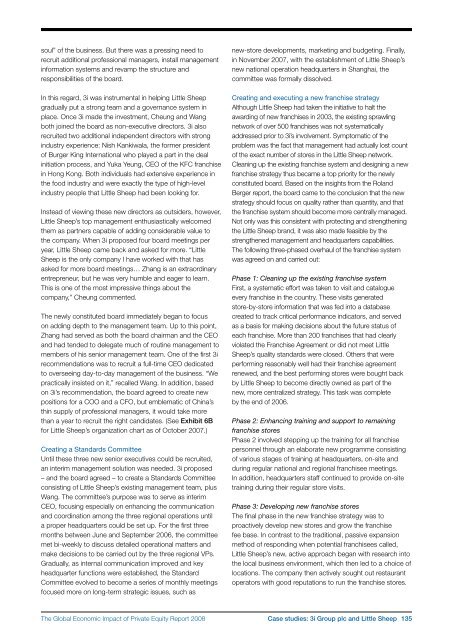investment banking, Lu was very sophisticated and ahead<strong>of</strong> the curve.” It turned out that earlier in his career, Lu hadworked on the senior management team <strong>of</strong> Meng Niu whenit received a widely publicized investment from MorganStanley and CDH, a well‐known Chinese private equity fund.Based on this previous experience, he was predisposed toworking with a private equity investor.Winning the mandateAfter the initial meeting in August, 3i engaged in afour‐month competition with other private equity suitors,including Goldman Sachs and Morgan Stanley, before finallybeing awarded the Little Sheep mandate. During this period,Anna Cheung, a 3i partner based in Hong Kong, wasassigned as the senior member on the team working withWang to secure the mandate. <strong>The</strong> investment team flewto Baotou frequently, getting to know Little Sheep’s seniormanagement team, and explaining 3i’s investmentphilosophy. At the same time, they spoke with a number<strong>of</strong> research analysts covering the Hong Kong and Chineserestaurant sector to learn more about the sector, and sharedtheir findings with Little Sheep senior management. <strong>The</strong>team also tapped into 3i’s network <strong>of</strong> industry experts – thePeople Programmes – and identified Nish Kankiwala, formerpresident <strong>of</strong> Burger King International, as a suitable advisorfor Little Sheep. As the top executive at one <strong>of</strong> the world’slargest fast food restaurant chains, Kankiwala would bringa wealth <strong>of</strong> sorely needed knowledge about the franchisebusiness. At the request <strong>of</strong> the 3i team, Kankiwala flewto Beijing and spent a number <strong>of</strong> days meeting with LittleSheep’s entire senior management team, learning theups and downs <strong>of</strong> the company’s performance anddiscussing the relevance <strong>of</strong> his own experience to LittleSheep’s future strategy. This was the first time that LittleSheep management had direct access to a world‐classexpert with a deep understanding <strong>of</strong> their business andthey were impressed by 3i’s commitment and ready accessto this calibre <strong>of</strong> expertise.But the spectre <strong>of</strong> Goldman Sachs continued to lurk inthe background. Wang heard that his former Goldmancolleagues were visiting Little Sheep in Baotou in late 2005,so he immediately flew there and was “prepared to sit thereuntil we signed the term sheet”. His persistence paid <strong>of</strong>f andfour months after Wang’s August cold call, 3i signed a termsheet with Little Sheep, agreeing to a $25 million equityinvestment for a minority stake in the company. (Prax Capital,a private equity fund focused on Chinese investments,invested $5 million as a co‐investor.) <strong>The</strong> transaction closedsix months later, in June 2006, and 3i’s real value‐add to thecompany began to take shape.Post‐investment Value‐creationForming a strategic blueprintDuring the six‐month period between the signing <strong>of</strong> themandate in late 2005 and the final closing in June 2006,3i worked closely with Little Sheep management to clarifya number <strong>of</strong> strategic questions that the company neededto address, and an agreement was reached to engageRoland Berger, a strategic consulting company, to providefact‐based analysis as a basis for resolving some <strong>of</strong> themost pressing issues.Based on extensive data collection and analysis, theconsultants made a number <strong>of</strong> specific recommendations,such as optimal store size and location in differentsub‐markets, 6 and how the company should overhaulits existing franchises (as described in the next section).<strong>The</strong>se findings and recommendations became the basis <strong>of</strong>a blueprint that outlined a step‐by‐step effort to pr<strong>of</strong>essionalizeand improve the company’s operations. When the analysisand recommendations were presented to the Little Sheepboard, the response was highly favourable.Mapping strategy to operations: the 180‐day planAided by the strategic insights gained from the RolandBerger report, 3i’s Wang drafted a “180‐day plan”, a detailedwork plan <strong>of</strong> tasks that the company needed to address inthe following six months, including specific financial, legal,operational and HR issues. (See Exhibit 6 for an excerptfrom Little Sheep’s 180‐day plan.) After discussing the planwith the management and obtaining their full commitment toexecuting it, it was then continuously tracked and updated.3i partner Anna Cheung explained: “<strong>The</strong> 180‐day plan helpedto provide structure and a time frame that gave all partiesinvolved a goal to work towards.”This detailed level <strong>of</strong> post‐investment involvement isstandard for all 3i investments, and it confirmed for LittleSheep management that 3i was willing and able to providethe non‐financial benefits that they had been seeking fromtheir private equity investor.Strengthening the management team and the boardBoth 3i and Little Sheep understood clearly that a criticaltask for the company prior to a public listing wasstrengthening the management team and board structure.Little Sheep’s management team had a high level <strong>of</strong> integrityand drive, but lacked depth: the entire top managementteam consisted <strong>of</strong> founder and CEO, Zhang, a senior vicepresident <strong>of</strong> finance, and three regional vice presidents. (SeeExhibit 6A for an organizational chart for Little Sheep before3i’s investment.) Even more significantly, as Wang remarked,“the company lacked systems such as centralized operationmanagement, new store development and marketing teams,which were crucial for the company to continue to grow in acoordinated manner”. Through the years, the company hadbeen carried forward almost entirely by a small team <strong>of</strong>managers united and motivated by the founder’s sheerpersonal strength and charm. “<strong>The</strong> founder, Mr Zhang, isan inspirational person,” remarked Cheung; and as one <strong>of</strong>Zhang’s lieutenants would confirm, he was “the heart and6For example, based on pr<strong>of</strong>itability analysis, it found that the optimal store size for tier‐1, tier‐2, and tier‐3 cites are 1200m 2 , 600m 2 , and 600m 2 ,respectively, and that the reason for most under‐performing stores (pr<strong>of</strong>itability < 5% <strong>of</strong> sales) was due to wrong store location.134 Case studies: 3i Group plc and Little Sheep<strong>The</strong> <strong>Global</strong> <strong>Economic</strong> <strong>Impact</strong> <strong>of</strong> <strong>Private</strong> <strong>Equity</strong> <strong>Report</strong> <strong>2008</strong>
soul” <strong>of</strong> the business. But there was a pressing need torecruit additional pr<strong>of</strong>essional managers, install managementinformation systems and revamp the structure andresponsibilities <strong>of</strong> the board.In this regard, 3i was instrumental in helping Little Sheepgradually put a strong team and a governance system inplace. Once 3i made the investment, Cheung and Wangboth joined the board as non‐executive directors. 3i alsorecruited two additional independent directors with strongindustry experience: Nish Kankiwala, the former president<strong>of</strong> Burger King International who played a part in the dealinitiation process, and Yuka Yeung, CEO <strong>of</strong> the KFC franchisein Hong Kong. Both individuals had extensive experience inthe food industry and were exactly the type <strong>of</strong> high-levelindustry people that Little Sheep had been looking for.Instead <strong>of</strong> viewing these new directors as outsiders, however,Little Sheep’s top management enthusiastically welcomedthem as partners capable <strong>of</strong> adding considerable value tothe company. When 3i proposed four board meetings peryear, Little Sheep came back and asked for more. “LittleSheep is the only company I have worked with that hasasked for more board meetings… Zhang is an extraordinaryentrepreneur, but he was very humble and eager to learn.This is one <strong>of</strong> the most impressive things about thecompany,” Cheung commented.<strong>The</strong> newly constituted board immediately began to focuson adding depth to the management team. Up to this point,Zhang had served as both the board chairman and the CEOand had tended to delegate much <strong>of</strong> routine management tomembers <strong>of</strong> his senior management team. One <strong>of</strong> the first 3irecommendations was to recruit a full‐time CEO dedicatedto overseeing day‐to‐day management <strong>of</strong> the business. “Wepractically insisted on it,” recalled Wang. In addition, basedon 3i’s recommendation, the board agreed to create newpositions for a COO and a CFO, but emblematic <strong>of</strong> China’sthin supply <strong>of</strong> pr<strong>of</strong>essional managers, it would take morethan a year to recruit the right candidates. (See Exhibit 6Bfor Little Sheep’s organization chart as <strong>of</strong> October 2007.)Creating a Standards CommitteeUntil these three new senior executives could be recruited,an interim management solution was needed. 3i proposed– and the board agreed – to create a Standards Committeeconsisting <strong>of</strong> Little Sheep’s existing management team, plusWang. <strong>The</strong> committee’s purpose was to serve as interimCEO, focusing especially on enhancing the communicationand coordination among the three regional operations untila proper headquarters could be set up. For the first threemonths between June and September 2006, the committeemet bi‐weekly to discuss detailed operational matters andmake decisions to be carried out by the three regional VPs.Gradually, as internal communication improved and keyheadquarter functions were established, the StandardCommittee evolved to become a series <strong>of</strong> monthly meetingsfocused more on long‐term strategic issues, such asnew‐store developments, marketing and budgeting. Finally,in November 2007, with the establishment <strong>of</strong> Little Sheep’snew national operation headquarters in Shanghai, thecommittee was formally dissolved.Creating and executing a new franchise strategyAlthough Little Sheep had taken the initiative to halt theawarding <strong>of</strong> new franchises in 2003, the existing sprawlingnetwork <strong>of</strong> over 500 franchises was not systematicallyaddressed prior to 3i’s involvement. Symptomatic <strong>of</strong> theproblem was the fact that management had actually lost count<strong>of</strong> the exact number <strong>of</strong> stores in the Little Sheep network.Cleaning up the existing franchise system and designing a newfranchise strategy thus became a top priority for the newlyconstituted board. Based on the insights from the RolandBerger report, the board came to the conclusion that the newstrategy should focus on quality rather than quantity, and thatthe franchise system should become more centrally managed.Not only was this consistent with protecting and strengtheningthe Little Sheep brand, it was also made feasible by thestrengthened management and headquarters capabilities.<strong>The</strong> following three‐phased overhaul <strong>of</strong> the franchise systemwas agreed on and carried out:Phase 1: Cleaning up the existing franchise systemFirst, a systematic effort was taken to visit and catalogueevery franchise in the country. <strong>The</strong>se visits generatedstore‐by‐store information that was fed into a databasecreated to track critical performance indicators, and servedas a basis for making decisions about the future status <strong>of</strong>each franchise. More than 200 franchises that had clearlyviolated the Franchise Agreement or did not meet LittleSheep’s quality standards were closed. Others that wereperforming reasonably well had their franchise agreementrenewed, and the best performing stores were bought backby Little Sheep to become directly owned as part <strong>of</strong> thenew, more centralized strategy. This task was completeby the end <strong>of</strong> 2006.Phase 2: Enhancing training and support to remainingfranchise storesPhase 2 involved stepping up the training for all franchisepersonnel through an elaborate new programme consisting<strong>of</strong> various stages <strong>of</strong> training at headquarters, on-site andduring regular national and regional franchisee meetings.In addition, headquarters staff continued to provide on‐sitetraining during their regular store visits.Phase 3: Developing new franchise stores<strong>The</strong> final phase in the new franchise strategy was toproactively develop new stores and grow the franchisefee base. In contrast to the traditional, passive expansionmethod <strong>of</strong> responding when potential franchisees called,Little Sheep’s new, active approach began with research intothe local business environment, which then led to a choice <strong>of</strong>locations. <strong>The</strong> company then actively sought out restaurantoperators with good reputations to run the franchise stores.<strong>The</strong> <strong>Global</strong> <strong>Economic</strong> <strong>Impact</strong> <strong>of</strong> <strong>Private</strong> <strong>Equity</strong> <strong>Report</strong> <strong>2008</strong> Case studies: 3i Group plc and Little Sheep 135
- Page 2 and 3:
The Globalization of Alternative In
- Page 5:
ContributorsCo-editorsAnuradha Guru
- Page 9 and 10:
PrefaceKevin SteinbergChief Operati
- Page 11 and 12:
Letter on behalf of the Advisory Bo
- Page 13 and 14:
Executive summaryJosh lernerHarvard
- Page 15 and 16:
• Private equity-backed companies
- Page 17 and 18:
C. Indian casesThe two India cases,
- Page 19 and 20:
Part 1Large-sample studiesThe Globa
- Page 21 and 22:
The new demography of private equit
- Page 23 and 24:
among US publicly traded firms, it
- Page 25 and 26:
should be fairly complete. While th
- Page 27 and 28:
according to Moody’s (Hamilton et
- Page 29 and 30:
draining public markets of firms. I
- Page 31 and 32:
FIguresFigure 1A: LBO transactions
- Page 33 and 34:
TablesTable 1: Capital IQ 1980s cov
- Page 35 and 36:
Table 2: Magnitude and growth of LB
- Page 37 and 38:
Table 4: Exits of individual LBO tr
- Page 39 and 40:
Table 6: Determinants of exit succe
- Page 41 and 42:
Table 7: Ultimate staying power of
- Page 43 and 44:
Appendix 1: Imputed enterprise valu
- Page 45 and 46:
Private equity and long-run investm
- Page 47 and 48:
alternative names associated with t
- Page 49 and 50:
4. Finally, we explore whether firm
- Page 51 and 52:
When we estimate these regressions,
- Page 53 and 54:
cutting back on the number of filin
- Page 55 and 56:
Table 1: Summary statisticsPanel D:
- Page 57 and 58:
Table 4: Relative citation intensit
- Page 59 and 60:
figuresFigure 1: Number of private
- Page 61 and 62:
Private equity and employment*steve
- Page 63 and 64:
Especially when taken together, our
- Page 65 and 66:
centred on the transaction year ide
- Page 67 and 68:
and Vartia 1985.) Aggregate employm
- Page 69 and 70:
sectors. In Retail Trade, the cumul
- Page 71 and 72:
employment-weighted acquisition rat
- Page 73 and 74:
FIguresFigure 1: Matches of private
- Page 75 and 76:
Figure 6:Figure 6A: Comparison of n
- Page 77 and 78:
Figure 8:Figure 8A: Comparison of j
- Page 79 and 80:
Figure 11: Variation in impact in e
- Page 81 and 82:
Figure 12: Differences in impact on
- Page 83 and 84:
Private equity and corporate govern
- Page 85 and 86:
et al (2007) track the evolution of
- Page 87 and 88:
groups aim to improve firm performa
- Page 89 and 90:
distribution of the LBO sponsors, m
- Page 91 and 92:
the most difficult cases. This stor
- Page 93 and 94:
to see whether these changes of CEO
- Page 95 and 96:
Figure 3:This figure represents the
- Page 97 and 98:
TablesTable 1: Company size descrip
- Page 99 and 100:
Table 5: Changes in the board size,
- Page 101 and 102: Table 7: Board turnoverPanel A: Siz
- Page 103 and 104: Part 2Case studiesThe Global Econom
- Page 105 and 106: European private equity cases: intr
- Page 107 and 108: Exhibit 1: Private equity fund size
- Page 109 and 110: Messer Griesheimann-kristin achleit
- Page 111 and 112: ealized it was not possible to grow
- Page 113 and 114: The deal with Allianz Capital partn
- Page 115 and 116: the deal, the private equity invest
- Page 117 and 118: Exhibit 1: The Messer Griesheim dea
- Page 119 and 120: Exhibit 5: Post buyout structureMes
- Page 121 and 122: New Lookann-kristin achleitnerTechn
- Page 123 and 124: feet. This restricted store space w
- Page 125 and 126: institutional investors why this in
- Page 127 and 128: Although a public listing did not a
- Page 129 and 130: Exhibit 5: Employment development a
- Page 131 and 132: Chinese private equity cases: intro
- Page 133 and 134: Hony Capital and China Glass Holdin
- Page 135 and 136: Hony’s Chinese name means ambitio
- Page 137 and 138: Establishing early agreement on pos
- Page 139 and 140: Executing the IPOEach of the initia
- Page 141 and 142: Exhibit 1A: Summary of Hony Capital
- Page 143 and 144: Exhibit 4: Members of the China Gla
- Page 145 and 146: Exhibit 6A: China Glass post‐acqu
- Page 147 and 148: Exhibit 8: China Glass stock price
- Page 149 and 150: 3i Group plc and Little Sheep*Lily
- Page 151: y an aggressive franchise strategy,
- Page 155 and 156: Exhibit 1: Summary information on 3
- Page 157 and 158: Exhibit 6: An excerpt from the 180-
- Page 159 and 160: Indian private equity cases: introd
- Page 161 and 162: ICICI Venture and Subhiksha *Lily F
- Page 163 and 164: investment,” recalled Deshpande.
- Page 165 and 166: 2005 - 2007: Moderator, protector a
- Page 167 and 168: Exhibit 3: Subhiksha’s board comp
- Page 169 and 170: Warburg Pincus and Bharti Tele‐Ve
- Page 171 and 172: founded two companies at this time
- Page 173 and 174: By 2003 this restructuring task was
- Page 175 and 176: Exhibit 1C: Private equity investme
- Page 177 and 178: Exhibit 4B: Bharti cellular footpri
- Page 179 and 180: Exhibit 6: Summary of Bharti’s fi
- Page 181 and 182: Exhibit 7: Bharti’s board structu
- Page 183 and 184: In the 1993‐94 academic year, he
- Page 185 and 186: consumer products. She was also a R
- Page 187 and 188: AcknowledgementsJosh LernerHarvard
- Page 189: The World Economic Forum is an inde















